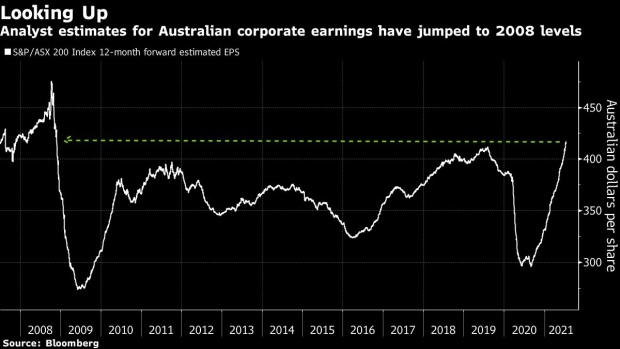Jul 27, 2021
Australia’s Lockdowns Scramble Optimism Over Corporate Earnings
, Bloomberg News

(Bloomberg) -- Australia’s biggest companies are headed for a challenging earnings season, as investor wariness about Covid-19’s resurgence overshadows expectations of stellar results.
The country’s continued economic expansion and past success in containing the virus have lifted profit estimates for the S&P/ASX 200 Index to their highest in over a decade. But that optimism around earnings is being tested by delta-variant outbreaks that have sent Australian cities into snap lockdowns.
“This is where investors will be seeking clarity from management about what comes next,” Eleanor Creagh, a market strategist at Saxo Capital Markets Ltd., wrote in an email. Companies offering forward guidance will trump those backward-looking results, she added.
Australia’s stock benchmark is trading at record highs, with its 13% surge in 2021 handily beating the MSCI Asia Pacific Index that’s erased all its gains for the year. The S&P/ASX 200 is up 1.6% so far in July, the strongest performance of any developed market in the region.
Still, the gauge has a lot of catching up to do when compared to its global peers -- it remains at the lowest level in more than two decades relative to the MSCI World Index, according to data compiled by Bloomberg.
Here are five things to watch as Australia’s earnings season kicks off:
Virus Outbreaks
Companies will detail the impact of Covid-19 curbs on their results amid a month-long lockdown in Sydney that’s showing no signs of easing.
While Australia has largely managed to limit the virus’s spread through quarantines, snap lockdowns, and border closures, a slow vaccine rollout has made the nation vulnerable to leaks of the highly contagious delta variant.
Uncertainty over lockdowns could temper outlooks from affected companies, Macquarie Group Ltd. analysts wrote in a July 21 note. “A miss on results could also cause a selloff in these stocks, but we would buy the dips in re-opening plays, as they offer growth within a slowing cycle,” they added.
Inflation
Investors will keep a close eye on how companies are handling growing costs and supply chain issues as the global economy picks up.
Corporate commentary “will focus on what inflationary pressures mean for margins in the near term,” said Karen Jorritsma, head of Australian equities at RBC Capital Markets.
Higher expenses could hurt margins of companies like retailer Super Retail Group Ltd. and plumbing products maker Reliance Worldwide Corp., Morgans Financial Ltd. analysts led by Andrew Tang wrote in a July 21 note. Meanwhile, businesses with strong operating leverage such as payments company Afterpay Ltd. are better placed to absorb higher inflation.
M&A
Companies could shed light on potential deals as mergers and acquisition interest heats up.
In recent weeks, firms such as Sydney Airport, Oil Search Ltd. and Altium Ltd. have rejected takeover approaches, with the pandemic making it harder to discern between appealing deals and ones that fall short.
Even $16.6 Billion Can’t Buy an Airport During the Pandemic
Still, low interest rates and improved earnings forecasts should spur more deal-making over the next year as businesses seek growth, Morgans said. While buying companies “purely for the potential of a takeover is a fraught strategy, we think it can offer some downside protection for embattled names.”
Mining Boom
Rallies in commodity prices are set to boost mining profits and dividend payments. Iron ore producers BHP Group and Fortescue Metals Group Ltd. are both expected to report record earnings and payouts, as prices for the steelmaking ingredient stay elevated, Macquarie wrote.
Banks, Miners to Lead Dividend Spree for Australian Stocks
Even so, miners are likely to offer insights on how labor shortages are affecting operations.
Rio Tinto Group in its March quarter production report said labor resource availability had disrupted its maintenance work in Western Australia, while Fortescue said in May that labor constraints contributed to rising costs at its Iron Bridge development. Resources firms have blamed labor issues on Australia’s international border closures and snap state lockdowns.
Consumer Spending
The outlook for the consumer discretionary sector is mixed after some retailers like JB Hi-Fi Ltd. recorded strong sales during the pandemic.
People have been buying items like cars, furniture and televisions “substantially above the pre-Covid peak” and are expected to keep doing so, said Alex Shevelev, senior analyst at Forager Funds Management Pty Ltd.
Jefferies sees retailers having a harder time coping with Australia’s latest round of virus measures, however. Decreased government support and signs of consumer fatigue could make consumer demand more subdued, analysts led by Michael Simotas wrote in a July 19 note.
©2021 Bloomberg L.P.


